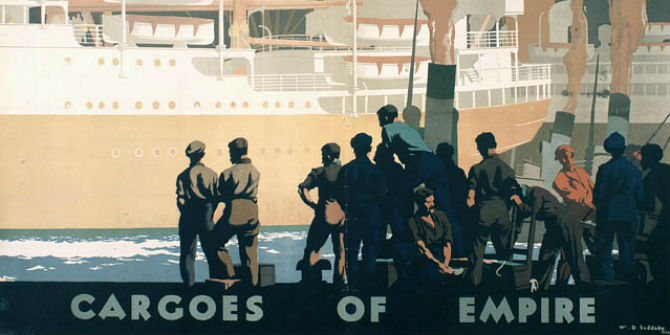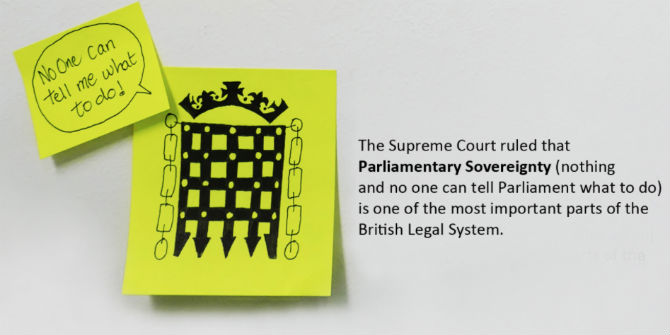 Nationalism is a key element of the Leave campaigns, says Michael Lloyd. But it takes very different forms on the right and left – and indeed in England and Scotland. On the right, nationalism draws on a nostalgic view of the Commonwealth. On the left, it subscribes to an English exceptionalism that believes a federal Europe is incompatible with the struggle against neoliberalism and capitalism.
Nationalism is a key element of the Leave campaigns, says Michael Lloyd. But it takes very different forms on the right and left – and indeed in England and Scotland. On the right, nationalism draws on a nostalgic view of the Commonwealth. On the left, it subscribes to an English exceptionalism that believes a federal Europe is incompatible with the struggle against neoliberalism and capitalism.
Some of the arguments made by the Leave camp appear to be linked to nationalism. Sometimes, as in the case of UKIP, it is a nostalgic nationalism. At other times it is a more xenophobic nationalism. It is important, for those of us who take the view that the future prosperity and geopolitical influence of the UK lies in an active partnership within the EU, to understand the mainsprings of these underlying nationalistic themes.
However, I would suggest that these nationalisms relate to England rather than to Scotland, Wales, and Northern Ireland. This is not to deny the nationalisms within the Celtic nations (with two ‘nationalist’ traditions in Northern Ireland). However, these Celtic nationalisms tend not to be directed at challenging UK membership of the EU.
The Empire and Britishness
English nationalism is a more slippery concept than might be imagined. As Kumar (2003) persuasively argues, for the English, presiding over an empire, there was no distinction made between being English and being British. In the global world of the British Empire, to be British was sufficient. It also enabled the Scots and Welsh to be co-opted into the British identity and to play key roles in imperial Britain.
But it is clear that until relatively recently (the last 20 years), with the increasing devolution to the Celtic nations, and the rise of a more aggressive Scottish ethno-nationalism, English nationalism has been a subdued affair. The even more recent rise in popularity of UKIP – an essentially right-wing English nationalist party – has drawn attention to demands for an English parliament. As Kumar suggests – despite UKIP’s appeal in both some suburban and rural middle-class areas and some socially and economically deprived working class enclaves – the vision of Englishness presented is taken from the 1920s:
It is an England that is rural or small-town, white, male, middle or upper-middle class, and fearful of change and the challenges of a global, multi-cultural world. (Kumar, 2003).
This latter-day, English nationalism appears to be being forged by a challenge from the nationalism in Scotland and, to a lesser extent, Welsh nationalism) and a fear of globalisation. This pressure and tension is exacerbated, for some English nationalists, by the fact of the UK’s membership of the EU, and their antipathy towards it.
We need to analyse a little further this antipathy towards the EU. First, one needs to separate the attitudes of the right and the left.

The objections to the EU on the Right, even viewed simply as a trading bloc, go back to the formation of the Anti-Common Market League (ACML) in 1961, following the first failed attempt of the UK to join the EEC. Principally attracting Conservative politicians and activists, the nostalgic nationalist element was focussed on free trade with the world and maintaining the UK’s trading links with the Commonwealth, particularly the white Commonwealth countries, e.g. New Zealand. In the longer run this concentration on the Commonwealth did have an impact on the UK’s negotiations with the EU in the early 1970s prior to accession. Achieving access for New Zealand butter and lamb and West Indies cane sugar occupied many hours of negotiating time of the UK civil servants and politicians involved. Echoes of this position are clearly present in the position on the right of the Leave camps.
In 1969 the ACML morphed into the wider Campaign for an Independent Britain (CIB) which is still active and campaigning for the UK to leave the EU. Despite the name Britain in the title – and referring to the comments from Kumar above – this appropriation of the title Britain is to cover the English nationalism which informs its positions. One of these is on sovereignty and democracy, so going beyond the trade and economic issues of the ACML.
Xenophobic nationalism
The other, xenophobic, English ethnic nationalism on the right, shading into violence from time to time, is associated with the National Front, the BNP, and the English Defence League. An element of this xenophobic nationalism may be seen in occasional outbursts from UKIP members, even though UKIP immediately distances itself from the individuals concerned and formerly disavows any such position.
What is true is that UKIP working class voters, particularly in the north of England, fell that they have been left behind in socio-economic terms and are threatened by EU migration which they equate with the forces of globalisation. The fact that the EU could be seen as a mitigating force protecting against any negative influences of globalisation is ignored.
Anti-EU sentiment on the left
The objections to the EU on the Left – though this point will be rejected by many on the left – are also informed by a nationalistic perspective. In this case it is the maintenance of a view which argues in favour of attempting to create ‘socialism in one country’. It is not possible to argue that this is a peculiarly English nationalism, though ironically this is a view prevalent on the left of the Scottish Nationalist Party. However, its underlying rationale is partly linked to a British/English exceptionalism in how to mount a successful challenge to capitalism or, latterly, neo-liberalism. There is often, in some sections of the essentially English Left, a misunderstanding and neglect of the history and current positioning of other European left groupings, parties, and movements.
More broadly, this undercurrent of nationalistic thinking also relates to the opposition to what is presented as an increasing federal Europe. This is partly because the term federal, in the UK, is seen as equating to centralisation. Despite the fact that this is exactly the opposite of what federalism means – i.e. the distribution of governance powers to the most appropriate decentralised level – its misapplication aids the idea that, in the EU, power is increasingly being centralised in Brussels.
Finally, the growth of English nationalism over the past 20 years or so has also made it difficult for some to appreciate that we all have multiple identities. One can be English and European at one and the same time, just as one can be a fiercely independent Geordie and also be English.
It will be interesting to see what part this resurgent English nationalism – linked to a British exceptionalism in relation to continental Europe, and bolstered by a misunderstanding of federalism – will play in persuading the English electorate to vote to leave the EU in the referendum. It is to be hoped that it will be recognised that sharing power is perfectly compatible with retaining national identity.
K Kumar. 2003. The Making of English National Identity, Cambridge University Press
This post represents the views of the author and not those of the BrexitVote blog, nor the LSE.
Dr Michael Lloyd is a Senior Research Fellow at the Global Policy Institute of London Metropolitan University.







English nationalism hasn’t only been muted … it has been virtually non-existent. The English seem to tie a lot more of their identity to being British than other residents of the British Isles, which is why you rarely if ever see a Cross of St. George flying in England (almost always a Union Jack) … Compare that to Scotland, Wales, and even NI. I’d be surprised if more than a few English would look at this as anything but a Brexit. The point about being a Geordie and English is interesting … there might actually be many who take issue with this, and I would not be surprised to start hearing about Wessex independence movements and the like in a few years.
Not sure when you last visited England Alex, but the Cross of St George has been prominent since the 1996 Euro competition.
Also, not sure about the Geordie/Wessex reference. The failure of the regionalism referendum in the North East was due to a concern that it would somehow dilute a sense of Englishness.
In addition to that, the 2011 Census introduced a question on national identity for the first time. English identity (either on its own or combined with other identities) was the most common identity and 37.6 million people (67.1 per cent) chose English as a sole identity.
So, can’t see any calls for Wessex independence anytime soon.
It might also be worth mentioning that, percentage-wise, the sense of Englishness is stronger the further north (and away from London) you go, and the Newcastle area is the last place with a significantly high population before you reach the border.
That’s a nice story but it isn’t actually borne out by statistics. The English often come out as ‘less British’ than the Welsh or Northern Irish in polling. The census underlined this http://www.bbc.co.uk/news/uk-24302914
I see several Cross of st George flags every day.
Since Kumar wrote in 2003 – based, presumably, on the situation in the 1990s – there has been a reshuffling of priorities and insertion of new issues. From England we are now more concerned about a dictatorial EU and, in the last year, the migrant crisis, Russian assertiveness and Middle East instability. The environmental issues that were big ideas 20 years ago are almost all, objectively worse, but they have lost their novelty and so been pushed off the radar by new concerns. The rise of social media and the way people learn about history through movie fiction rather than traditional history is changing the way billions come across new information and perspectives and, thus, the way we exercise our critical faculties. I would prefer to see this analysis updated for 2016.
It’s the Scottish National (not Nationalist) Party.